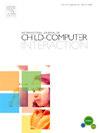为下一代家长控制提供用户视角
Q1 Social Sciences
International Journal of Child-Computer Interaction
Pub Date : 2025-04-04
DOI:10.1016/j.ijcci.2025.100735
引用次数: 0
摘要
最近的研究表明,青少年早期(即10-14岁)在没有充分了解数字礼仪和风险的情况下使用在线服务。家长控制已被提议作为一种工具,让父母观察他们的孩子的数字使用。然而,由于缺乏可用性,以及隐私和安全控制不足,文献揭示了家长控制采用的减少。本研究从调查当前解决方案中的障碍或驱动因素开始,探讨了下一代父母控制如何促进提高儿童的数字能力和网络安全意识。研究人员对10 - 13岁孩子的父母和5位不同领域的家长控制专家进行了6次半结构化访谈,并对11岁和12岁的孩子进行了4次焦点小组会议(N=14)。结果表明,现有的家长控制工具被认为是非教学性的,在提高儿童的数字知识和网络安全意识方面缺乏功能。它们为父母提供了监控的可能性,却没有给孩子自我调节的机会。这强调了实施未来家长控制的重要性,教育孩子成为数字独立,同时在一定程度上允许父母保持对孩子的数字习惯的控制。总的来说,该研究通过增强此类应用的重要性并提出发展方向,为未来父母控制的潜在用途和影响提供了另一种视角。本文章由计算机程序翻译,如有差异,请以英文原文为准。
Providing user perspectives to the next generation of parental controls
Recent studies indicate that early adolescents (i.e., 10-14-year-olds) are accessing online services without an adequate understanding of digital etiquette and risks. Parental control has been proposed as a tool for parents to observe their children’s digital use. However, the literature reveals a decreasing parental control adoption, due to the lack of usability, and insufficient privacy and security controls. Starting from an investigation of barriers or drivers in current solutions, this study explores how next-generation parental controls could facilitate increasing children’s digital competence and cybersecurity awareness. Six semi-structured interviews were conducted with parents of 10–13-year-olds and five experts within various domains of parental control, along with four focus group sessions (N=14) with 11- and 12-year-olds. The results indicate that existing parental control tools are perceived as non-pedagogical and lacking functionalities in increasing children’s digital knowledge and cybersecurity awareness. They provide parents with monitoring possibilities, without granting the children opportunities for self-regulation. This underlines the importance of implementing future parental controls that educate children to become digitally independent, while to an extent allowing parents to maintain control of their children’s digital habits. Overall, the study provides another perspective on the potential use and implications of future parental control by enhancing the significance of such applications and suggesting directions for development.
求助全文
通过发布文献求助,成功后即可免费获取论文全文。
去求助
来源期刊

International Journal of Child-Computer Interaction
Social Sciences-Education
CiteScore
7.20
自引率
0.00%
发文量
73
 求助内容:
求助内容: 应助结果提醒方式:
应助结果提醒方式:


